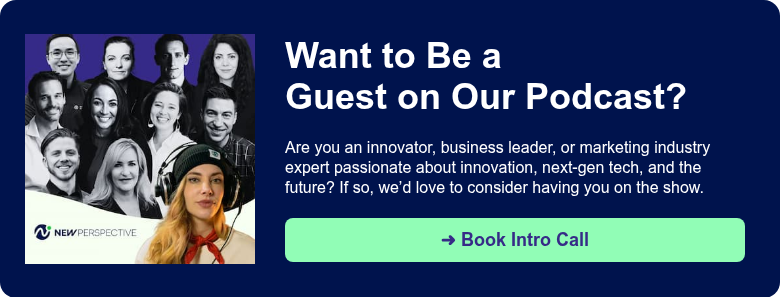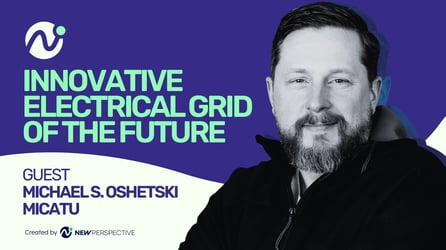Cooling Without Heating Up The Planet: Spotlight on Glacier Grid
Join us for this episode of the Green New Perspective podcast as we talk with Manik Suri, founder and CEO of Glacier Grid. Learn how he his team are developing solutions to reduce the warming effects of air conditioning and refrigeration—systems that contribute significantly to global warming.
Manik explains how Glacier Grid’s technology turns traditional cooling systems into smart, efficient tools for both grid operators and end-users. By using software, hardware, and data science, they optimize energy usage based on occupancy, time of day, weather, and energy prices.
Listen to success stories, including how they helped a restaurant chain cut utility bills by nearly 20%. He also shares upcoming developments in data science and AI, focused on improving energy consumption even further.
For cleantech entrepreneurs, Manik gives valuable advice on navigating the industry, emphasizing resilience and adaptability—especially during challenges like COVID-19.
Don't miss this conversation filled with practical insights and innovations making a real impact in the fight against climate change.
🎥 Guest: Manik Suri, CEO of Glacier Grid
🔗 Web: https://www.glaciergrid.com/
📝 Full episode transcript
Hello and welcome to the Green New Perspective podcast. Thanks so much. Great to be here. So can you introduce yourself and give us a brief overview of your tech? Absolutely. Uh, pleasure to be here. Uh, my name is Manik Suri. I'm the founder and CEO at Glacier Grid. Uh, we're a technology startup, uh, building, uh, solutions to reduce the warming caused by cooling.
Ironically, cooling air conditioning and refrigeration are responsible for almost 10 percent of warming and that problem is getting worse at Glacier Grid. We're using software, hardware and data science to turn dumb equipment into smart, controllable loads, creating virtual power out of stationary air conditioning and refrigeration.
And how has your tech improved the efficiency? For grid operators and well, users on the location where you implemented it. Yeah, several things. Uh, we help, uh, business owners that have cooling, uh, reduce their energy bills and reduce their total use. Uh, we turn equipment on and off and we turn it up and down based on factors like occupancy, time of day.
Weather energy price. Uh, so we can reduce the use of equipment when no one's there, for example, or when locations are closed or when energy is super expensive, uh, we do that by balancing the cost and the delivery of the energy with the comfort and convenience, essentially. And we use real time monitoring of temperature and humidity to make sure we don't spoil product or have unhappy guests and consumers coming into these locations.
On the grid side, we help reduce the load. and move it around by participating in demand response and by helping, uh, balance or, or reduce peak load, uh, and shave, uh, shave the load, uh, strategically. And can you share a success story? Sure. Uh, we had a customer recently, uh, Saj Mediterranean. It's a growing, uh, restaurant chain in the Bay area.
I live in San Francisco. So, uh, you know, familiar with it as a consumer myself, uh, going over to have, uh, some, some high end Mediterranean cuisine, um, we were able to help them reduce their. Utility bill by almost 20 percent a month, uh, by implementing smart cooling and by using their energy and their equipment more intelligently.
And, um, what are some of the upcoming developments or innovations that you're most excited about? I think there's a huge opportunity to leverage data science. Uh, we've built a small data science team and it's growing. Uh, as we collect more and more information from locations and equipment, uh, we see the opportunity to get better at localizing our optimization.
So it turns out that a location might run differently if it's a McDonald's versus, say, a Taco Bell. They have different types of products, different customer profiles, different service intervals. So knowing what kind of location you're in and whether it's in Los Angeles, Uh, Texas or Boston, for example, those kinds of local, um, variables can really affect whether to use the energy, when to use it and how much to use.
Uh, and it's a great problem for applied data science. Ultimately, we can turn that into a self learning, self adjusting system and really bring, uh, artificial intelligence to bear. That's the long term ambition of the optimization function. But the first step is to collect a bunch of data. We're in about 4, 000 locations today with a little over a thousand customers and growing.
So, uh, that's the plan. And what advice would you give to some other founders who are stepping into this clean tech world? Uh, we need it. So keep going. Uh, I would say, uh, the world needs more, uh, climate positive solutions and we need more. Uh, folks building the future, I think that anybody who steps into entrepreneurship, you know, is, uh, is taking on a big challenge, but also a huge, uh, opportunity both to grow personally and to shape the future.
So I wish every climate entrepreneur, you know, much luck, um, and, uh, you know, and happy to help and be supportive in any way I can. And what challenges have you faced? How can they overcome them based on your experience? Depends on which day of the week, hence today's a Thursday. So, you know, uh, so many challenges.
I think that entrepreneurship is humbling because, uh, firstly, you have limited resources, so it's always about doing as much as you can with very fixed and tight constraints, so that's a challenge. Um, and I think learning to be scrappy, learning to be, um, disciplined, uh, and learning to be. That's a huge, uh, part of becoming successful, which we're still working through in the early years, but, um, but definitely a big part of, of, of success.
A second, I would say is, uh, agility, uh, being able to change direction, take new information. We launched our company a few months before the pandemic, uh, started. And, uh, you know, we were raising our first round, uh, in, uh, Q1 of 2020. I can tell you that there were not a lot of venture capitalists who wanted to invest in a new technology being sold to restaurants.
Uh, when COVID 19 started, that was not an easy moment. Um, we were able to get, um, early product market fit by finding a segment, which was quick service restaurants, fast food in the U S that were doing really well because people could still get take out and drive through. Uh, and so that allowed us to find a vertical that was actually still in business.
The rest of the hospitality and restaurant industry in 2020 was basically dead because of the COVID 19 pandemic. But because we found that one use case, we could grow and we tripled in 2020 and then again in 21, and that allowed us to raise money, keep going. And then as the world recovered, we expanded.
So agility, you know, responding to the world around you. And then the last thing is resilience. Um, it really is a marathon, you know, one foot in front of the next. And, uh, there are many, many moments when I've wanted to, uh, To, to give up and, and, uh, move on. And, and I think that, um, you know, staying in the game, just staying in the race is a big part of it and, uh, finding ways to dig deep, uh, surround yourself with people who support you, uh, surround yourself with great, uh, colleagues.
All those things help, um, with resilience and grit. Yeah. You mentioned that you're here to share your knowledge. So where can people learn more about your company, about you, where they can connect with you? Would love to be in touch and be supportive and and also if you're interested in our work around clean cooling Please reach out.
Our website is GlacierGrid. com Manik at GlacierGrid. com is my email. M A N I K. I'm on X and And of course LinkedIn, so please reach out. We're based in the Bay Area, but hiring remotely. and excited to chat more. Mike, thank you. This is the end of our conversation. Thank you for being a part of the Green New Perspective podcast.
Thank you. Great to be here. Appreciate it.
🎧 Subscribe to our podcast
- Spotify: https://bit.ly/3PSWIyI
- Apple Podcasts: https://bit.ly/3RvlHte
- YouTube: https://bit.ly/3RDzkXg
- Deezer: https://bit.ly/3PvQaof
- Amazon Music: https://bit.ly/3PQlijS
💬 Follow GNP on Social
Host & Co-Producer: Dunja Jovanovic
Executive Producer: Marko Bodiroza
Creator: Nathan Harris
Video & Sound Editor: Marija Davidoski



